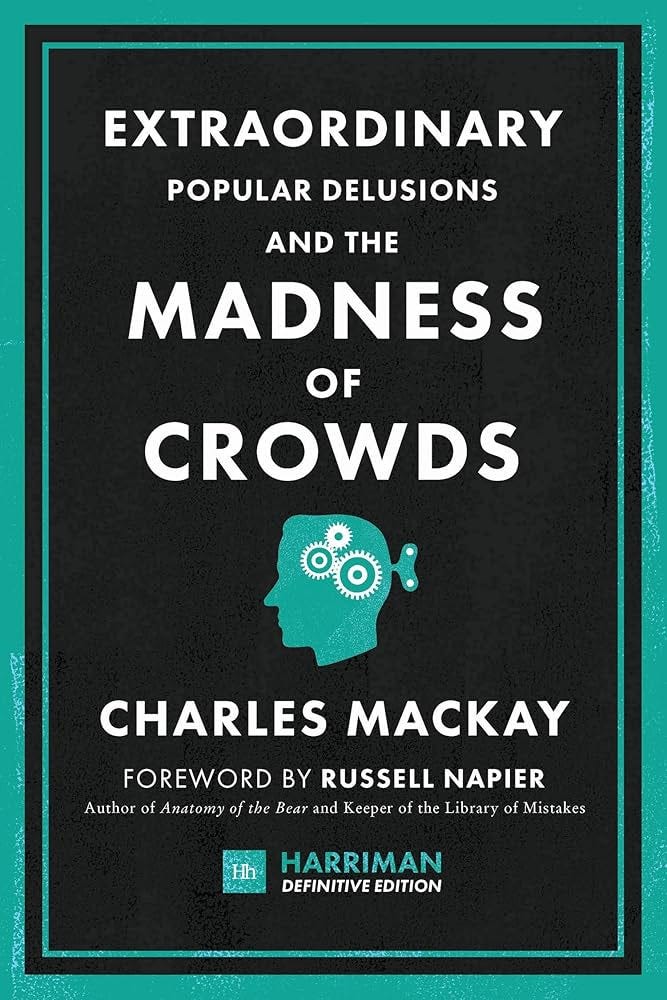How Educated, Smart People Can Go Horribly Wrong & Cause Incalculable Damage
One of my favorite Substackers (@Gurwinder) coined this term "Fashionably Irrational Belief Systems" (FIBS) and it's perfect
Full disclosure - I have never read Scottish poet, journalist, and author Charles Mackay’s book, the 1841 seminal work Extraordinary Popular Delusions and the Madness of Crowds, but obviously it has had a huge influence on our culture - people instinctively know what’s referred to when people talk about “crowd madness” and “crowd delusion” - and indeed I’ve invoked it plenty when I’ve talked about the last four years of Coronaphobia.
It seems to fit so many things, particularly over the last few years.
After all, why else would the entire world, much less the educated elites amongst us, jettison the last 100 years of knowledge about masks and viral spread to peddle these bizarre, paranoid ideas about the efficacy of surgical masks and the dynamics of viral spread, or push Orwellian, anti-human ideas like “social distancing,” or resuscitate frankly totalitarian ideas like “vaccine passports” in order access restaurants, coffee shops, museums, and grocery stores?
Obviously, it’s because we’ve all gone crazy.
It’s a “crowd madness.” It’s a temporary condition, caused by external forces, something in the air, some unique confluence of stressors and environment to produce a pathological state in humans.
It’s a medical condition.
The problem I have with this explanation is that it’s ultimately unsatisfying. I’ve never been satisfied by explanations that involve pathologizing human behavior, as I feel it leads to circular explanations that don’t get to root causes.
We also don’t just excuse the Nazi doctors who conducted brutal human experiments on unwilling victims by saying “oh, it was a just a crowd madness,” do we?
Ultimately, it’s an unsatisfying, circular idea that seems to excuse people from moral culpability.
Fashionably Irrational Belief Systems (FIBS)
I was listening to a Chris Williamson interview recently (honestly, I’ve only tuned into the guy twice), the one he did with Eric Weinstein, and during it there was an observation made about how useful it is to name concepts, to essentialize a concept by naming it parsimoniously, simply, and recognizeably.
This is pretty prosaic anecdote, but bear with me - in the interview, Weinstein is trying to illustrate a pretty important thing about the modern world we live in, that it’s moving so fast that language almost is unable to keep up:
“We haven't yet invented the concepts that make modern life tolerable. I think that you, I, and a bunch of people in podcasting land are searching for these missing concepts. I give the example of the word ‘selfie’ because it's the best example I've ever seen. Why did people take pictures of themselves in mirrors in restaurant bathrooms? Nobody knew; it didn't make any sense. At some point, someone coined the word selfie, and it was instant. We'd all seen this phenomenon, but nobody had a concept for it. It was even the word of the year. The reason is that you needed it because it was everywhere, but until it had a term to nucleate around, it was just a strange behavior." - Bret Weinstein, “Modern Wisdom” Podcast, from the 9/2/24 episode “Are We On The Brink Of A Revolution?”
Right? Before the word “selfie” came about - it was bizarre.
Why were women taking random pictures of themselves in bathroom mirrors and posting it on their social media feeds? It didn’t make sense.
But then the word “selfie” was invented and the world suddenly made sense - we had a name for it, which helped to, as Weinstein said, ennucleate the concept. It both gave it a name and encapsulated the phenomenon in an easily available manner in the public’s mind.
This is one reason why I got so excited watching this video:
The content is is a mashup of some excellent artwork by the YouTube channel “After Skool” and the below article by Gurwinder Bhogal, who runs the Substack “The Prism.”
The article is below:
This article and accompanying video go a long way towards explaining some persnickety problems in society - ones we are in the West (if not worldwide) facing head on as we speak.
It All Makes Sense Now
FIBS surround us in our culture. Mr. Bhogal identifies a few in his video / article, for example, “Wokeism” with it’s bizarre insistence on a number of irrational beliefs such as:
gender ideology - men can become women & vice versa
“fat acceptance” is healthy
rationality and reason are tools of oppressive systems run by white men
What makes these ideas unique and pernicious is that while irrational, they are the purview of intelligent people. To wit:
“It’s intelligent but not rational because its goal is not objective truth, or even social justice, but social signaling, and in pursuing this goal it’s a powerful strategy. People who engage in woke rituals, such as telling obese people they’re perfect just the way they are, or encouraging kids to question their gender, or calling for the defunding of the police, signal to others that they’re cultured and compassionate toward society’s designated downtrodden. Their demands often end up hurting rather than helping the marginalized, but they make some people feel good for a while, and they increase their own social status, which explains why wokeism is most prevalent in industries where status games and image are most important: politics, media, academia, entertainment, and advertising.” - Gurwinder Bhogal “Why Smart People Believe Stupid Things.”
But there’s more.
For a lot of progressives who may be reading me or Mr. Bhogal’s essay - the reaction at this point might be deep discomfort or outright rejection. But it’s useful to try and get a little distance via historical analogy.
In the late 1900s to the 1940s, the western world became enamored with eugenics - a set of beliefs and practices aimed at improving the genetic quality of human populations through selective breeding, often by promoting reproduction among those deemed genetically "fit" and inhibiting it among those considered "unfit".
Originating in the late 19th century, the movement gained popularity in the early 20th century, leading to policies such as forced sterilizations and marriage restrictions, and was closely associated with scientific racism and discrimination.
Obviously, it’s disgusting to think about now - but this is another example of a FIB. It was a belief system of the educated, of the elite, and if you believed it you were part of “polite society,” and even though believing in these ideas hurt people more than it helped anyone - it didn’t matter. Those professing these ideas felt good, and advanced themselves in society because of their adherence (After Adolf Hitler was defeated in World War II - the ideas of eugenics went out of fashion).
FIBS are Created and Maintained via Powerful Social / Reputational Incentive Structures
Think about what we just experienced with the COVID pandemic.
There was an entire system of interwoven FIBs that was engineered and propagated via centralized control of social media (via Government-Organized Non Governmental Organizations, or GONGOs like Graphika or the so-called Stanford Internet Observatory) that perpetuated all manner of irrationality and used the supposed emergency of the COVID pandemic to do it.
Almost overnight, all manner of ideas that were long recognized to have had no objective basis in fact, which were then foisted on the world, not only via threat of force (fines, sometimes imprisonment etc.) but through fear of social ostracism, fear of excommunication, loss of status, loss of job, being labelled “far right,” or “anti-vaxxer” or “racist.”
In Conclusion - It’s Better to talk about FIBs than about “Crowd Madness”
For sure, - the medicalized concept of "crowd madness" provides a convenient explanation for the irrational behaviors and beliefs that have permeated society that many have grown comfortable with. But it falls short - and I think provides convenient excuses for exactly the people who should be held accountable. After all - it seems deeply wrong for an “expert” who has pointed the world in the wrong direction, even catastrophically so, to simply say “it was a heady time, it was the fog of war, it was crowd madness.”
The notion of Fashionably Irrational Belief Systems (FIBs) offers a more nuanced understanding, and more importantly, exposes exactly what the problem is with our increasingly managerialist sociopolitical system in the west - where entire swaths of the economy and public life are run by supposedly objective, scientific principles enacted by selfless, able technocrats (“Taylorism”).
The idea of FIBs and how depressingly common it is that these continue to pop up amongst the expert class - and do so much damage to society - underscores the social and reputational incentives can drive intelligent individuals to adopt irrational beliefs, not for the pursuit of truth, but for social signaling and status. The idea of FIBs overlaps well with the ideas of Public Choice Theory - which “focus(es) on how elected officials, bureaucrats, and other government agents' perceived self-interest can influence their decisions.”
By recognizing and naming these FIBs as what they are - a phenomenon that is specific and particular to educated, intelligent, and status-conscious individuals and avoiding medicalizing them as somehow metaphorical illness, or as just not being smart or capable enough - I think we can start to understand where the problems with our increasingly managerialist world in the west are coming from.
We have a very, very serious problem in the West. We need to fix it. The last four years, to me, have been a crash-course in this - yet none of the people and systems responsible have been held to account, at least as of yet.
In order to fix the problem, we need to identify it and name it properly. This is a start.











Absolutely spot on. Thank you for this.
Great article 👍